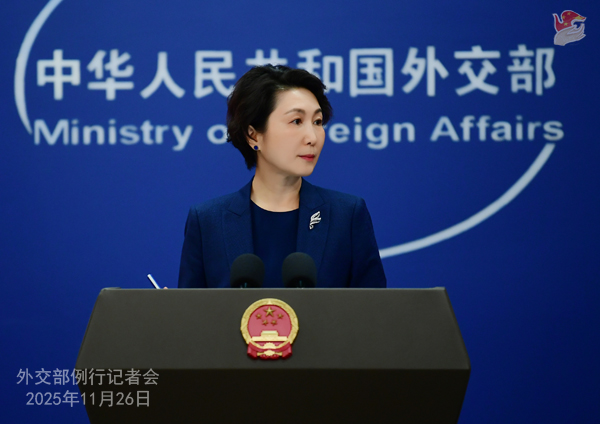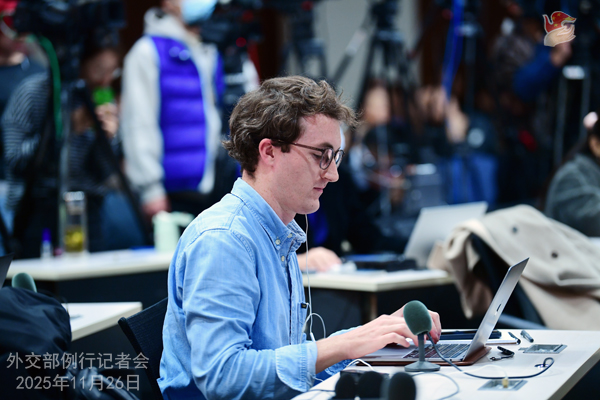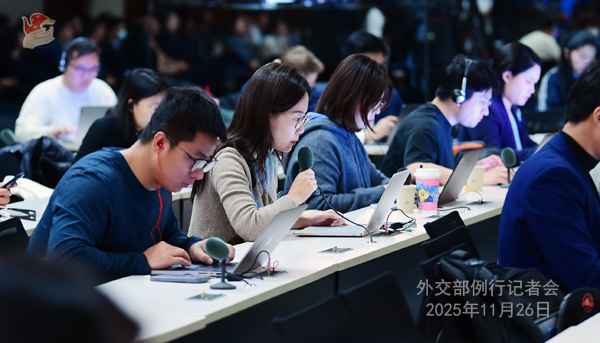
People’s Republic of China


People’s Daily: On November 25, on whether Japan’s policy regarding existential threats remains unchanged, the Japanese government adopted a statement at a cabinet meeting saying that Prime Minister Sanae Takaichi’s remarks at the parliamentary committee meeting does not change Japan’s consistent position. The statement stressed that the determination will be made by considering all available information based on the specific situation, and that the government fully maintains its position and does not believe a review or reconsideration is necessary. The statement also says that the peace and stability in the Taiwan Strait is highly important to Japan’s security and the overall stability in the world, and the Japanese side hopes to see a peaceful settlement through dialogue. What’s your comment?
Mao Ning: On Japanese Prime Minister Takaichi’s erroneous remarks on Taiwan, China has stated its serious position more than once. Those remarks seriously violate the spirit of the four political documents between China and Japan, erode the political foundation of China-Japan relations, and challenge the post-war international order. China has made clear its firm opposition. The remarks have been questioned and criticized by visionary people inside Japan, and met with condemnation from the international community.
The Japanese government’s November 25 statement continues to repeat that its position on Taiwan is either “consistent” or “unchanged”. That is hardly adequate. What China and the international community want are answers to these questions: What exactly does the Japanese side mean by what they call “consistent position”? Does the Japanese side still follow the one-China principle? The Japanese side should honestly, accurately and fully articulate what that “consistent position” is. Soft-pedaling the issue, putting out unspecified notions without touching on the essence of the issue, and hoping that somehow the issue would resolve itself—such kind of approach will certainly not go anywhere.
Not only that, the Japanese side, instead of turning back from the wrong course, again made irresponsible remarks in the statement regarding the Taiwan question and interfered in China’s internal affairs. Let me stress that Taiwan is China’s Taiwan. How to resolve the Taiwan question and realize national reunification is purely China’s own affair and not for Japan to point fingers or even meddle in it. China once again urges the Japanese side to take seriously what it has heard from China, reflect on and correct its wrongdoing, retract the erroneous remarks without delay, and take practical steps to honor its commitments to China.
Reuters: Did China ask the U.S. to convey any message to the Japanese side given that the U.S.-Japan call was so soon after the China-U.S. call?
Mao Ning: China has released a readout on the phone call between the Chinese and U.S. presidents, which you may refer to. I have nothing more to share on that.
NHK: The Chinese government has reportedly directed Chinese airlines to reduce the number of flights to Japan through March 2026. Can the Foreign Ministry confirm those reports?
Mao Ning: I’d refer you to competent authorities.
AFP: The U.S. top envoy in Taiwan Raymond Greene said today that he welcomes a US$40 billion military spending plan announced today by Taiwan. Does the Foreign Ministry have a comment on these remarks by Raymond Greene or on Taiwan’s new military spending plan?
Mao Ning: China opposes official interactions and military ties between the U.S. and China’s Taiwan region. This position is consistent. The DPP authorities will not succeed in resisting reunification and seeking “independence” through military buildup.

The Paper: It’s reported the 18th Europe-China Business & Technology Cooperation Fair was successfully held in Chengdu. What’s your comment on China-Europe economic and trade cooperation?
Mao Ning: Since 2002, a total of 18 Europe-China fairs have been held, attracting the participation of over 12,000 Chinese and European companies and reaching over 3,300 tentative cooperation deals. The fair is the largest investment, trade, innovation and cooperation platforms between China and Europe, with the most extensive participation from both EU member states and EU businesses.
China and the EU are highly complementary economically with deep convergence of interests. Economic and trade cooperation provides the anchor of China-EU relations. Over the past 50 years since the establishment of China-EU diplomatic ties, annual bilateral trade has grown from US$2.4 billion to more than US$780 billion, and the stock of two-way investment has jumped to over US$270 billion. So far, nationals of 25 EU member states can travel to China visa-free. The China Railway Express has run nearly 120,000 trips, reaching more than 200 cities in 26 European countries. The respective strengths of China and the EU enabled mutual benefit and delivered tangibly to people of both sides. We stand ready to continue stepping up economic and trade cooperation with the EU, and promoting the sound and steady development of China-EU relations. We also hope the EU can honor its commitment to openness and seize the important opportunities offered by China’s development.
AFP: Kyrgyzstan said yesterday that it had arrested the Chinese CEO of gold mining firm Kemin Resource Group. This firm has been accused of causing environmental damage and providing false information to authorities. Does the Chinese Foreign Ministry have any comment or further information on this case?
Mao Ning: We noted relevant reports. China’s embassy in Kyrgyzstan is verifying what happened to get more information. The Chinese government always asks Chinese nationals and companies overseas to abide by local laws and regulations and run their businesses in accordance with the law. We hope that Kyrgyzstan will ensure impartial law enforcement and protect the legitimate and lawful rights and interests of Chinese companies and nationals there.
NHK: The Chinese Foreign Ministry recently advised Chinese citizens to avoid visiting Japan due to rising crimes targeting Chinese nationals. Japan has most recently released crime data of cases affecting Chinese in the country and said China’s assertion is incorrect. What’s the Foreign Ministry’s comment?
Mao Ning: There have been a multitude of crimes targeting Chinese nationals in Japan. Just last week, Japanese police arrested five people suspected of attacking Chinese nationals. A lot of extreme and threatening rhetoric against China can be found on the Internet in Japan. The Chinese embassy and consulates in Japan have been recently repeatedly harassed, both online and offline, by right-wing provocateurs. We urge the Japanese side to take China’s concerns seriously, and make concrete efforts to ensure the safety and security of Chinese nationals and institutions in Japan.
Bloomberg: Earlier today about an hour ago, Prime Minister Takaichi was speaking in the Diet and she was asked about her comments on November 7. And she said that she was asked by a member of Parliament and she has responsibility to explain government actions to the people and she answered that question sincerely to try to clarify to the people and Parliament, which is her responsibility. Is it your contention that she shouldn’t have made those remarks and she shouldn’t have explained sincerely the position of the government? How can the Japanese government further clarify their position on this to the satisfaction of the Chinese government?
Mao Ning: China’s stance is clear. We ask Japan to retract the erroneous remarks and honor its political commitments to China through concrete actions.
Phoenix TV: Sources say that Prime Minister of Saint Vincent and the Grenadines Ralph E. Gonsalves has engaged with the Chinese side and explored the possibility of developing relations with China. Could the Foreign Ministry confirm that?
Mao Ning: The one-China principle is a prevailing international consensus and a basic norm in international relations. The establishment of diplomatic relations between China and 183 countries fully demonstrates that upholding the one-China principle is the right thing to do and is where the arc of history bends and public opinion trends. We hope relevant countries will see the prevailing trend, meet their people’s aspirations, and make the right decision at an early date.




